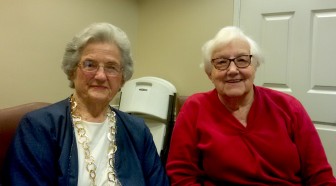How an Alabama Congressman Got the Government to Help Pay for College
Women outnumber men on college campuses. But that wasn’t always the case. Carl Elliott, the late former Alabama Congressman, co-authored the National Defense Education Act in 1958, which improved science, foreign language and technology education nationwide and provided low-interest loans for college and graduate school for needy students. It also opened the door for women to attend college. We have this story from our friends at the Ways & Means podcast, hosted by Emily Hanford. You can listen to the full story on their website.
Hubertein Scott was the third of seven children in St. Paul, Minnesota, and grew up during the Great Depression. She wanted to go to college, but her father wouldn’t let her. “College was not even a remote possibility,” she said. “I was told take shorthand and typing, marry the boss and you’re set.”
After Scott got married, she still wanted to go to college. Her husband finally agreed, but he had conditions. “He told me I had to be home when children left for school at 9, be home when they got home at 3, dinner on the table at 6 and in bed at 10.”
And it wasn’t just husbands and fathers who made it hard for women to get degrees. Colleges did too. They routinely used gender quotas.
Duke University professor Deondra Rose, who wrote a book about the history of women’s access to college, says some colleges outright excluded women. “And so women knew that if I wanted to go to college I’m going to have to have higher grades than the men who were also applying for college at the same time,” Rose says. “And even then you could get your application returned to you with just a note that says women need not apply.”
Enter an unlikely hero – Carl Elliott. He was a young lawyer in Alabama when he ran for Congress in 1948. He wanted the federal government to help make it easier for all young people to get college degrees – especially poor kids.
Carl Elliott’s parents were tenant farmers. He traces his love of learning to his grandmother. “She taught me a great deal about the love of reading because she read so beautifully,” Elliott said.
After high school, Elliott set off for the University of Alabama on foot with just $2 in his pocket. Mary Allen Jolley, Elliott’s aide, says he left home walking to get there. “And it was 120 miles from where he lived in Franklin County,” she says. “He spent two nights sleeping under a truck because he had nowhere to live. He often told me the greatest achievement I ever made in my life was to get a college education. He said it was nearly impossible.”
After getting elected to Congress, Carl Elliott hired Mary Allen Jolley as his aide and he drafted a proposal for the federal government to start offering college scholarships. But Southern states worried that if they allowed the federal government to provide funding for anything related to education, the feds might demand faster school integration. So his proposal went nowhere. But then on Oct. 4th, 1957, the Soviet Union launched Sputnik 1, and as a result the U.S. lost the space race. “So with the stunning defeat in the space race, the United States panicked,” Rose says.
Elliott and his colleague, an Alabama senator named Lister Hill, decided the time was right to pitch their scholarship proposal again, but this time, they’d argue that federal support for helping needy kids get to college was crucial to ensuring the nation’s security.
“They gave it a fancy new title and they called it the National Defense Education Act,” Rose says.
They called for $1.6 billion dollars for scholarships and student loans. And anyone could apply — even women. It changed Hubertein Scott’s life in many ways, she says. Thanks to the National Defense Education Act, Scott is now Dr. Hubertein Scott. She was able to get a PhD because of the money that program provided. She now lives in a retirement community in Tuscaloosa, where, in a surprising twist, one of her neighbors is Mary Allen Jolley – Carl Elliott’s former aide.
“It had been, oh gosh, 50 years where I had nobody to thank for changing my life and suddenly here she is living in the same building with me,” Scott says. “It’s great.”
- Find out more about the Ways & Means podcast
- Watch a short film about Carl Elliott’s life
- Take a virtual tour of the Carl Elliott museum
- Read Carl Elliott’s memoir, The Cost of Courage
Bill making the Public Service Commission an appointed board is dead for the session
Usually when discussing legislative action, the focus is on what's moving forward. But plenty of bills in a legislature stall or even die. Leaders in the Alabama legislature say a bill involving the Public Service Commission is dead for the session. We get details on that from Todd Stacy, host of Capitol Journal on Alabama Public Television.
My doctor keeps focusing on my weight. What other health metrics matter more?
Our Real Talk with a Doc columnist explains how to push back if your doctor's obsessed with weight loss. And what other health metrics matter more instead.
Baz Luhrmann will make you fall in love with Elvis Presley
The new movie is made up of footage originally shot in the early 1970s, which Luhrmann found in storage in a Kansas salt mine.
Forget the State of the Union. What’s the state of your quiz score?
What's the state of your union, quiz-wise? Find out!
A team of midlife cheerleaders in Ukraine refuses to let war defeat them
Ukrainian women in their 50s and 60s say they've embraced cheerleading as a way to cope with the extreme stress and anxiety of four years of Russia's full-scale invasion.
As the U.S. celebrates its 250th birthday, many Latinos question whether they belong
Many U.S.-born Latinos feel afraid and anxious amid the political rhetoric. Still, others wouldn't miss celebrating their country









